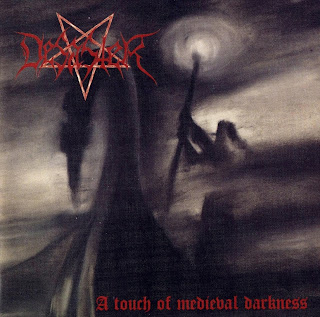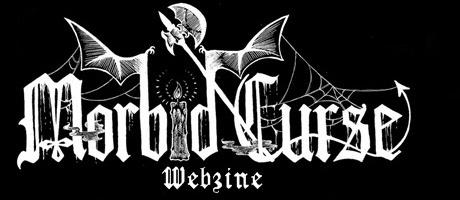
|

|

Desaster is one of the elite bands of the German black metal scene,
though one that does not seem to get nearly enough recognition. Formed in the late 80s, this band carried on the old school
tradition while mixing in influences from the Second Wave and their own epic songwriting to create a rather unique sound.
The band suffered a few minor setbacks, regarding the line-up, but persevered. They finally released their first full-length
album, A Touch of Medieval Darkness, in April 1996, on Merciless Records.
It
begins with "Skyline in Flames", a lengthy intro that sets the mood, aiding the listener in drifting off to another world.
This is done with synth, utilizing no traditional instruments, but it somehow suits the vibe of the album and serves as a
good lead-in for the first song.
"In A Winter Battle" is one of the best songs on here, and is a demonstration of utter
brilliance. Despite the fact that the harsh vocals and tremolo riffs seem to have something in common with the bands of that
age, the songwriting actually betrays more of an 80s influence in rhythm and melody. The composition is varied and epic, showing
true skill in arrangement and the riffs flow from one to the next, seamlessly. The atmosphere is rather sombre, though the
lyrics tell the tale of Viking raids on holy places, resulting in death and destruction. The guitar tone is thin, which fits
the music very well, while never reaching an abrasive level of rawness. The production is actually kind of clear, without
being overdone at all. Even the bass shines through at times, and it plays an important role during those moments, helping
add a sense of darkness to the overall sound. Though the song is only five and a half minutes long, the feeling is so epic
that you get the sense of having undertaken some great journey.
The title track begins with an intro that possesses
sort of a majestic feeling, building up to a great old school galloping riff. The atmosphere is dark and sorrowful, though
Okkulto's vocals still maintain a sense of barbarism. While the previous song included some blast beats, this one remains
mid-paced. Things slow down even more, beyond the halfway point, before returning to the main theme. Infernal's guitar riffs
are very memorable and hearken back to Bathory, at certain points.
"Fields of Triumph" picks right up where the previous
song left off, really giving this album a sense of consistency. Instead of a collection of random songs, this really comes
off like a coherent effort, with the arrangement of songs working perfectly to create the desired effect. This song starts
out with a dismal guitar riff that is reminiscent of Mayhem or Burzum, before transitioning to another galloping riff. Some
thrash riffs are interspersed, reminding one of early Sodom. Near the middle, everything clams down and a cold tremolo riff
is all that remains, soon joined by blasting drums and hellish screams. This is yet another display of a perfect blending
of First and Second Wave influences, sounding absolutely natural.
The next song is short and bears more of a blackened
speed metal approach. "Devil's Sword" is straightforward and less dynamic than the other songs on here, which adds to the
structure of the album in that it offers a little bit of a break from the more epic arrangements. It includes some half-paced
thrash riff that is sort of useless and displeasing, but this is not a massive detriment.
"Into A Magical Night" sounds
familiar during the opening moments, before the thrash riffs give way to a more intense tremolo melody. Again, this song is
more direct and less introspective. However, it leans that way in the closing moments. A solid track, but overshadowed by
some of the others.
Eerie winds and mythical tones introduce "Crypts of Dracul". The mood soon darkens, as a woeful
bass line drags you into the murky shadows and into the realm of foggy cemeteries and bloodthirsty ghouls. The intro is somewhat
lengthy, but definitely suits the music and helps build the anticipation. A melancholic tremolo riff soon emerges, maintaining
Odin's melody, along with the morbid screams rising in the lands beneath the frozen moon. There is a sense of urgency in Okkulto's
voice that is not present elsewhere on the album. Late in the song, there is a section that is very reminiscent of early Slayer,
with the screeching guitar solos, accompanied by funeral bells. The drumming includes some blast beats, though is mostly dominated
by an older style of playing, complimenting the riffs. This epic track is very memorable and the main theme is certain to
haunt you for some time to come. The pace picks up in the closing moments, ending in a more intense manner.
"Deep in the icecold mountains
Where the air freezes the soul
Where
all human life ends
The palace of Dracul is built"
"Visions in the Autumn Shades" is a slower song with an epic, yet ethereal, atmosphere that is different from
anything else on the album. The bass lines offer a glimmer of hope and optimism, yet this is slowly strangled by the morose
melodies and venomous curses spewed forth by the vocalist. While not an exceptionally strong track on its own, it fits well
into the tapestry of the album.
The final proper song is "Porter of Hellgate", which starts with a doom-inspired riff,
before shifting toward a primitive Black / Thrash sound. The rhythm possesses an epic quality, much like most of the songs
here, and the vibe is more energetic and yet dark at the same time. Slower sections help pull you down toward the fires below,
intensifying the evil feeling.
"Dome of the Brave" is an outro, touching upon the intro theme from the title track,
and bearing sort of a heroic vibe before the instruments fade out and an ominous sounds foreshadow a grim fate. It evokes
the same feeling as when you are awakening from a dream that, somehow, feels more real than your actual life, and you can
sense that you are about to be torn from that other world, and you can do nothing about it.
A Touch of Medieval Darkness is pure genius. It is the perfect combination of speed, thrash and Bback metal
riffs, with drumming that suits each different style and harsh vocals that help tie it all together. There are brief moments
when one gets the impression that this is how certain Moonblood songs would have sounded, with better production. The epic
feeling that is conveyed by this album is difficult to describe, as this really is one of those albums that you must experience
for yourself. Why this record is not more well-known and revered is beyond me, as it is a true classic. Seek this out and
make haste in doing so.
(8 Oct. 2011)

The Stormbringer E.P. was
released in 1997 on Merciless Records, bridging the gap between A Touch of Medieval Darkness
and Hellfire's Dominion. It is notable in that it features a full line-up, eliminating
the need for a session drummer. The music is a little more straightforward than on their debut album, though keeping in the
same vein.
"Stormbringer" starts out with a morose intro, soon leading into a maelstrom of violence and darkness. The
song features tremolo riffs and blasting drums alternating with sections that possess more of a speed metal feel, somewhat
due to the overall rhythm and songwriting approach. Okkulto's voice is as raw as ever, seeming quite unrestrained and filled
with hatred. The atmosphere takes on a more epic tone, near the middle, with the introduction of a new melody. This track
sounds as if it could have been a holdover from the previous album, as it would have fit in perfectly. As the song comes to
an end, the intense riffs give way to a calm acoustic piece.
The next song still maintains some of the same feeling.
"The Swords Will Never Sink" begins with an ominous intro riff, before shifting to a Teutonic Thrash sound, similar to the
older works of Destruction and Kreator. There is a nice old school guitar solo, later on, that adds a lot to the song. This
is another example of why solos should not be abandoned. This track is shorter and more direct than the previous one, and
is a good representation of this release as a whole.
"Sacrilege" is the shortest song on here, featuring classic Thrash
riffs that maintain an 80s feeling. In fact, this sounds as if it could have come out a decade earlier, between the songwriting
and the ugly production. It is clear enough to hear what is going on, but does not sound modern at all.
This is followed
by "Face of Darkness", which almost sounds similar to early Bethlehem or Paragon Belial, in the opening moments. As soon as
the tremolo riffs transition to the more Sodom-inspired Thrash, this sense is completely lost. There are slower parts that
help add a bit of darkness to the atmosphere, but this does not last long. The most unique thing about this track is the lengthy
ending, which hearkens back to the old days, with the multiple false finishes.
Their tribute to the past continues
with a filthy rendition of Kreator's "Tormentor", a favourite for many fans. The primitive and barbaric vibe of the original
is maintained, as they opted to remain loyal to the version that appeared on Endless Pain.
One can hardly tell that it is a different band, other than the vocals.
The final song is "Emerging Castleland", which
is an instrumental that is in line with the material from the first full-length, possessing a sort of medieval feeling and
serves as a nice way to wrap up this release. Though the rhythm seems to be more upbeat, the actual feeling of the song is
kind of dismal.
Stormbringer is not essential, though the title track ensures
that it is not so easily dismissed, either. Otherwise, there is not much here that can not be found on the albums that precede
and follow. Its strongest appeal may be for those who prefer the original vocalist, or just for the fact that it is a decent
slab of Teutonic metal that upholds the old style. For anyone into the older albums from the likes of Kreator, Sodom and Destruction
(or even newer bands like Aura Noir and Nifelheim), this will not disappoint.
(9 Oct. 2011)
|

|

|


